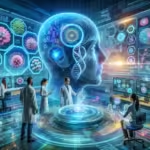Understanding the Role of AI in Assessing Biological Age
Artificial Intelligence (AI) is rapidly transforming various sectors, and healthcare is certainly at the forefront of this technological revolution. Recently, AI has begun to show promising capabilities in reassessing how we determine a patient’s biological age, which could potentially revolutionize personalized medicine, improving early diagnosis and treatment of age-related diseases such as cancer.
The Concept of Biological Age
Traditionally, age is measured in chronological terms. However, biological age offers a more accurate reflection of an individual’s physiological state. Unlike chronological age, which simply counts the years since birth, biological age considers numerous biological markers of aging, including cellular damage, molecular changes, and functional capacity.
Why Biological Age Matters
Understanding biological age can provide crucial insights into an individual’s health status. By determining if a person’s biological age is younger or older than their chronological age, healthcare professionals can predict health outcomes and identify risks for specific diseases. Key benefits include:
– **Personalized Health Assessments**: Tailored monitoring and interventions based on individual aging markers.
– **Enhanced Disease Screening**: Early detection of diseases by recognizing premature aging signs.
– **Customized Treatment Plans**: More effective treatment regimens based on actual physiological conditions rather than age alone.
The Advent of AI in Healthcare
AI harnesses advanced algorithms and data analytics to process vast amounts of medical data, which is revolutionizing how we understand and treat diseases. The intersection of AI and biological age presents an exciting frontier in predictive and preventative healthcare.
AI Algorithms in Biological Age Assessment
AI systems are being developed to evaluate biological age by analyzing various biomarkers collected through:
– **Genetic Profiling**: Identifying potential risks linked to genetic predispositions.
– **Wearable Technology**: Collecting data on physical activity and vital signs in real-time.
– **Medical Imaging**: Enhancing diagnostics through the analysis of medical images of organs and tissues.
These AI-driven assessments prove immensely valuable in identifying discrepancies between chronological and biological age—highlighting areas that may require medical intervention.
Impact on Cancer and Other Age-Related Diseases
One of the most significant applications of AI-driven biological age assessment lies in its potential to transform cancer diagnosis and treatment. Here’s how:
Cancer Diagnosis and Treatment
Cancer, often linked with aging, is a prime target for AI-driven interventions. By assessing biological age, AI technologies can significantly enhance cancer care:
Addressing Other Age-Related Conditions
Beyond cancer, AI’s role in assessing biological age can tremendously benefit the management of other age-related diseases including cardiovascular diseases, diabetes, and neurodegenerative disorders:
– **Proactive Monitoring**: Regular assessments to prevent disease progression in patients predisposed to age-related conditions.
– **Targeted Interventions**: Enhanced precision medicine approaches acting upon the unique biological makeup of individuals.
Challenges and Ethical Considerations
Despite these advancements, challenges remain in integrating AI for biological age assessment. Key considerations include:
Data Privacy and Security
With the increasing digitization of health data, privacy concerns are paramount. Safeguarding personal health information and addressing regulatory compliance form a crucial aspect of AI deployment in healthcare.
Algorithm Bias and Fairness
Ensuring AI algorithms are fair and unbiased is critical to effective healthcare delivery. Efforts must focus on developing and deploying AI systems that are equitable and address disparities across diverse populations.
Validation and Standardization
AI technologies must undergo rigorous validation to become reliable tools in routine medical practice. Establishing standardized methods of measuring biological age is crucial for AI systems to be widely accepted and trusted by healthcare providers.
The Road Ahead
The evolving application of AI in assessing biological age promises remarkable strides in healthcare. As research and development continue to advance, the potential impacts are vast, with the possibility of extending healthy life spans and improving quality of life for many.
The journey toward integrating AI in healthcare requires ongoing collaboration among scientists, healthcare professionals, policymakers, and technologists. Together, a future can be envisioned where healthcare is no longer reactive but proactive—focused on prevention and tailored to the unique biological blueprint of each individual.
This transformation, spearheaded by AI, offers immense promise, and the journey toward intelligent, personalized healthcare is poised for exciting progress as we continue to unravel the complexities of human aging and disease.








